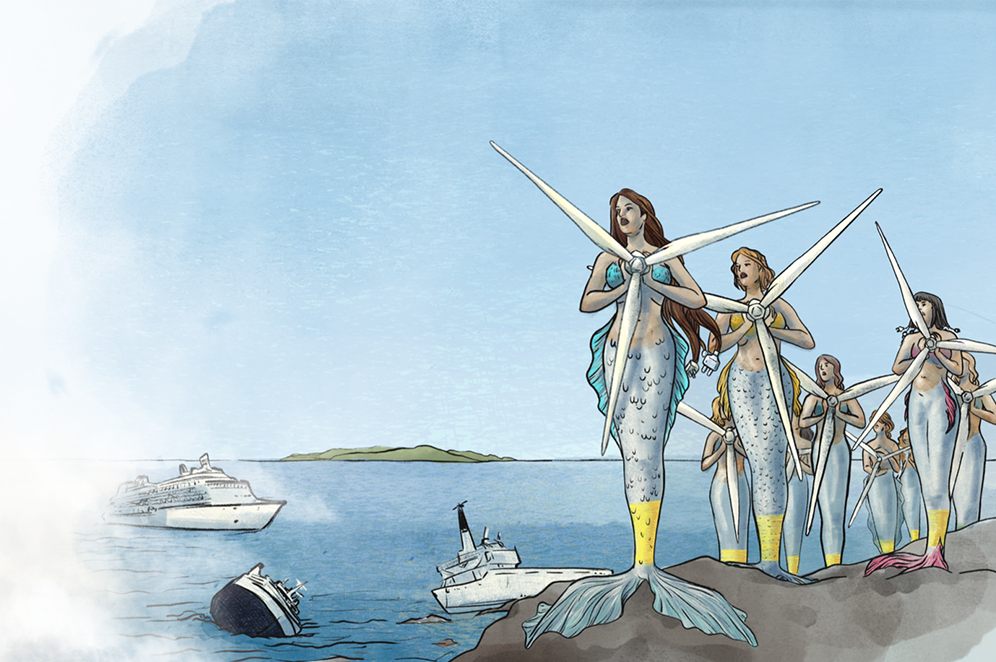A new paper uses fairy tale characters as metaphors to communicate insights from energy research to non-academic audiences.
Our new paper, published in Energy Research and Social Science, uses fairy tale characters as metaphors to re-communicate insights from energy research in the social sciences to non-academic audiences, highlighting barriers in current UK policies as well as opportunities to bring about change.
Motivated by the typically specialist language of energy research in the social sciences, we developed a way to re-communicate research insights around climate change to broader audiences – like policymakers – who have the power to enact change based on existing findings. Building on the current momentum of storytelling in energy research, we believe that fairy tale characters can act as useful metaphors for re-communicating salient points and potential routes forward.
Working with illustrator Véronique HeijnsbroekOpens in a new tab, we translated three cases (renewables, cars, and plastics) using fairy tale characters (mermaids, vampires, witches).
This blog focuses on our translation of renewable energy research through the character of the mermaid, thinking of UK’s policy fixation upon it, its attendant allure and song, as well the preferable role it could take as a figurehead in net-zero policy strategies.

The UK is fixated by the allure of wind power’s promise. It has invested heavily in wind power and is home to the world’s largest offshore wind farm. Despite having increased wind power generation by 715% (ONS, 2021Opens in a new tab), governmental subsidies are currently being offered to increase capacities even further.
This fixation is perhaps unsurprising; wind power is an attractive solution. It’s cheap, reduces some forms of pollution, and offers a level of security that is not afforded by energy importation. The political and research focus on renewables only adds further bewitchment. This focus sings to us, implying that it is not the organisation of society or current levels of consumption that are the problem: it is simply the technologies used to harness and generate energy supplies. If the issue is technological, the accompanying presumption is that little change is required on the part of industry and consumers in the form of demand reduction.
Sharp rocks, however, may lie ahead. The weather conditions required are variable, as are patterns of consumption, meaning that supplies are not always available to meet levels of demand as and when they happen. Stop gaps will be required. Storage is currently expensive, and it is not always possible to store excess capacities at the levels required (Rippy, 2021Opens in a new tab). This was especially evident in 2021, when low wind levels across the North Sea meant that a coal plant previously on standby had to be fired up (BBC, 2021Opens in a new tab).
Despite the dangers of fixating on energy supply over consumption, when it comes to demand reduction strategies, technological efficiencies have been foregrounded – with these expected to deliver targets of 78% below 1990 levels by 2035, and net-zero by 2050 (Committee on Climate Change, 2020Opens in a new tab). But as Barrett et al. (2021Opens in a new tab) argue, current measures are far lower than what is required, and at the current rate, it would take 150 years to fully decarbonise (Barrett et al., 2022Opens in a new tab).
Important roles for renewables do exist as the UK navigates the seas towards net-zero, much like mermaids who have helped sailors avoid peril on long voyages. Commonly carved on nautical vessels between the 16th and 20th centuries to appease the seas and ensure good weather (Cordingly, 2001, pdfOpens in a new tab), mermaids accompanied ships on dangerous journeys. Figureheads did not, however, replace the hard work of sailors, the need to keep watch, nor the value of a competent captain to navigate rough seas and ensure that desire destinations were reached. Society’s remaining supplies of fossil fuels must stay in the ground (van Asselt, 2021Opens in a new tab) and renewables are crucial in these efforts, meaning that they must accompany other policy responses too. Multi-pronged strategies are necessary. In its singular fixation, society is currently ignoring other paths and routes towards net-zero.
The wicked and urgent problems of climate change require creative forms of communication that allow energy research in the social sciences to reach necessary audiences, beyond academia. Whilst communication strategies like this might appear to be somewhat reductive, they can help translate core message in quick, digestible, and memorable ways.
We invite other energy researchers to join us for an online writing retreatOpens in a new tab, beginning on 28 August 2023, to translate their own research context and to extend this cast of characters.
Banner photo credit: Mostafa Ashraf Mostafa on Unsplash



